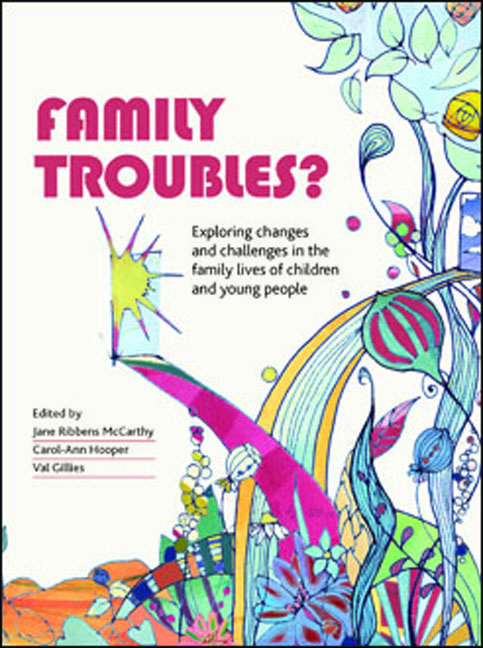Book contents
- Frontmatter
- Contents
- Notes on contributors
- Foreword
- Preface
- 1 Troubling normalities and normal family troubles: diversities, experiences and tensions
- Part One Approaching family troubles ? Contexts and methodologies :Introduction to Part One
- Part Two Whose trouble ? Conteste d definitions and practice: Introduction to Part Two
- Part Three The Normal, The Troubling And The Harmful?: Introduction to Part Three
- Part Four Troubles and transitions across space and culture: Introduction to Part Four
- Part Five Working With Families: Introduction to Part Five
- Index
Part Five - Working With Families: Introduction to Part Five
Published online by Cambridge University Press: 07 September 2022
- Frontmatter
- Contents
- Notes on contributors
- Foreword
- Preface
- 1 Troubling normalities and normal family troubles: diversities, experiences and tensions
- Part One Approaching family troubles ? Contexts and methodologies :Introduction to Part One
- Part Two Whose trouble ? Conteste d definitions and practice: Introduction to Part Two
- Part Three The Normal, The Troubling And The Harmful?: Introduction to Part Three
- Part Four Troubles and transitions across space and culture: Introduction to Part Four
- Part Five Working With Families: Introduction to Part Five
- Index
Summary
Families come into contact with state agencies in a range of contexts – from before their children's birth and throughout their childhoods – and the impacts of public policy and family members’ interactions with professionals on their troubles have been evident in many chapters. This part brings into focus: the ways families are worked with in different national contexts (see the chapter by Boddy); the potential and limitations of some key current policy developments in Anglophone countries in relation to the growth of parenting education programmes (see the chapter by Churchill and Clarke) and the increased attention to fathers’ roles (see the chapter by Featherstone); and the kinds of theoretical, moral and philosophical thinking needed to work with families in trouble, to build resilience (see the chapter by Vetere), to protect children at risk (see the chapter by Forsberg) and to reflect critically on the meanings-in-context of family members’ experiences and the values informing intervention (see the chapter by Ribbens McCarthy). Themes from previous chapters reappear here, especially the issue of contested definitions and practices (see the chapters by Churchill and Clarke and by Forsberg) and of the uncertain boundary between the ordinary and the harmful (see the chapters by Featherstone; Forsberg; Ribbens McCarthy).
Since the mid-1990s, growing critiques of the child protection systems developed to respond to family troubles in the UK and other Anglophone countries, which prioritise the identification of children at risk within highly proceduralised approaches (see, eg, Lonne et al, 2009), have led a number of researchers to look to other countries and learn from alternative approaches (Heatherington et al, 1997; Freymond and Cameron, 2006; Covell and Howe, 2009). Janet Boddy's chapter draws on two studies conducted across European countries, based on interviews with professional stakeholders and expert reviews, to explore similarities and differences in the way support for families is positioned within wider policy frameworks, and the ways specific approaches reflect both different countries’ assumptions about the relationship between families and the state and their broader approaches to social welfare. Her analysis contrasts the assumed divide between ordinary and troubled families implicit in the way services are organised in the UK with continental European countries where institutionalised rights to support for all children and/or families, and a more professionalised holistic approach to family support embedded within universal services, makes specialist help more easily accessible and ‘trouble’ less stigmatised.
- Type
- Chapter
- Information
- Family Troubles?Exploring Changes and Challenges in the Family Lives of Children and Young People, pp. 257 - 262Publisher: Bristol University PressPrint publication year: 2013

